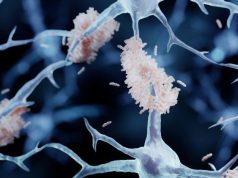Menopausal status the predictor most consistently and strongly linked to brain differences, after sex
FRIDAY, June 26, 2020 (HealthDay News) — Cognitively normal women have increased Alzheimer disease endophenotype, with higher β-amyloid deposition, lower glucose metabolism, and lower gray and white matter volumes, according to a study published online June 24 in Neurology.
Aneela Rahman, Ph.D., from the Weill Cornell Medical College in New York City, and colleagues assessed 121 cognitively normal participants (85 women and 36 men) aged 40 to 65 years with clinical, neuropsychological, lifestyle, magnetic resonance imaging (MRI), 18F-fluorodeoxyglucose (FDG)-, and 11C-Pittsburgh compound B (PiB)-positron emission tomography examinations to explore sex differences in late-onset Alzheimer disease.
The researchers found that compared with the male group, the female group showed higher PiB β-amyloid deposition, lower FDG glucose metabolism, and lower MRI gray and white matter volumes after adjustment for each modality-specific confounder. Compared with the female group, the male group did not show biomarker abnormalities. The results were independent of age, and significance persisted using age-matched groups. Menopausal status was the predictor most consistently and strongly associated with observed brain biomarker differences, after female sex, and followed by hormone therapy, hysterectomy status, and thyroid disease.
“The present findings provide support for the idea that the optimal window of opportunity for Alzheimer disease preventive interventions in women is early in the endocrine aging process,” the authors write.
Abstract/Full Text (subscription or payment may be required)
Copyright © 2020 HealthDay. All rights reserved.








